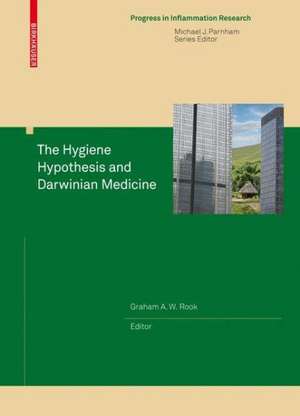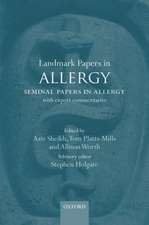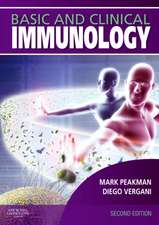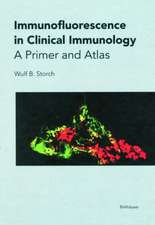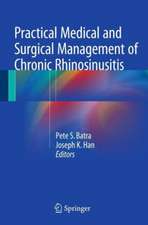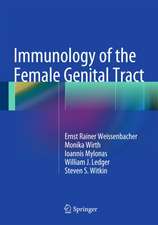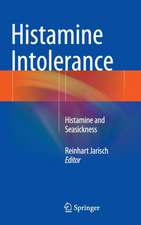The Hygiene Hypothesis and Darwinian Medicine: Progress in Inflammation Research
Editat de Graham A.W. Rooken Limba Engleză Hardback – 14 aug 2009
Din seria Progress in Inflammation Research
- 5%
 Preț: 1615.04 lei
Preț: 1615.04 lei - 5%
 Preț: 1433.10 lei
Preț: 1433.10 lei - 5%
 Preț: 723.05 lei
Preț: 723.05 lei - 18%
 Preț: 950.21 lei
Preț: 950.21 lei - 15%
 Preț: 648.42 lei
Preț: 648.42 lei - 5%
 Preț: 1300.72 lei
Preț: 1300.72 lei - 5%
 Preț: 1103.95 lei
Preț: 1103.95 lei - 5%
 Preț: 1061.93 lei
Preț: 1061.93 lei - 5%
 Preț: 715.35 lei
Preț: 715.35 lei - 5%
 Preț: 1098.63 lei
Preț: 1098.63 lei - 5%
 Preț: 657.90 lei
Preț: 657.90 lei - 5%
 Preț: 717.93 lei
Preț: 717.93 lei - 5%
 Preț: 996.71 lei
Preț: 996.71 lei - 5%
 Preț: 1413.72 lei
Preț: 1413.72 lei - 5%
 Preț: 1102.46 lei
Preț: 1102.46 lei - 5%
 Preț: 1102.82 lei
Preț: 1102.82 lei - 5%
 Preț: 991.70 lei
Preț: 991.70 lei - 5%
 Preț: 1115.86 lei
Preț: 1115.86 lei - 5%
 Preț: 720.31 lei
Preț: 720.31 lei - 5%
 Preț: 1611.76 lei
Preț: 1611.76 lei - 5%
 Preț: 654.23 lei
Preț: 654.23 lei - 5%
 Preț: 1414.64 lei
Preț: 1414.64 lei - 5%
 Preț: 652.77 lei
Preț: 652.77 lei - 5%
 Preț: 1099.94 lei
Preț: 1099.94 lei - 5%
 Preț: 1856.59 lei
Preț: 1856.59 lei - 15%
 Preț: 644.95 lei
Preț: 644.95 lei - 5%
 Preț: 1108.72 lei
Preț: 1108.72 lei - 5%
 Preț: 658.46 lei
Preț: 658.46 lei - 5%
 Preț: 1108.51 lei
Preț: 1108.51 lei - 24%
 Preț: 801.38 lei
Preț: 801.38 lei - 5%
 Preț: 715.19 lei
Preț: 715.19 lei - 5%
 Preț: 721.40 lei
Preț: 721.40 lei - 5%
 Preț: 991.70 lei
Preț: 991.70 lei - 5%
 Preț: 720.68 lei
Preț: 720.68 lei - 5%
 Preț: 1100.09 lei
Preț: 1100.09 lei - 15%
 Preț: 577.87 lei
Preț: 577.87 lei - 5%
 Preț: 652.77 lei
Preț: 652.77 lei - 5%
 Preț: 653.35 lei
Preț: 653.35 lei - 5%
 Preț: 650.25 lei
Preț: 650.25 lei - 5%
 Preț: 1116.73 lei
Preț: 1116.73 lei - 5%
 Preț: 1096.98 lei
Preț: 1096.98 lei - 5%
 Preț: 1412.62 lei
Preț: 1412.62 lei - 5%
 Preț: 1420.49 lei
Preț: 1420.49 lei - 5%
 Preț: 721.77 lei
Preț: 721.77 lei - 5%
 Preț: 1102.10 lei
Preț: 1102.10 lei - 5%
 Preț: 1099.20 lei
Preț: 1099.20 lei
Preț: 1807.08 lei
Preț vechi: 1902.19 lei
-5% Nou
Puncte Express: 2711
Preț estimativ în valută:
345.78€ • 361.99$ • 286.11£
345.78€ • 361.99$ • 286.11£
Carte tipărită la comandă
Livrare economică 05-19 aprilie
Preluare comenzi: 021 569.72.76
Specificații
ISBN-13: 9783764389024
ISBN-10: 3764389028
Pagini: 320
Ilustrații: XII, 308 p.
Dimensiuni: 170 x 244 x 25 mm
Greutate: 0.89 kg
Ediția:2009
Editura: Birkhäuser Basel
Colecția Birkhäuser
Seria Progress in Inflammation Research
Locul publicării:Basel, Switzerland
ISBN-10: 3764389028
Pagini: 320
Ilustrații: XII, 308 p.
Dimensiuni: 170 x 244 x 25 mm
Greutate: 0.89 kg
Ediția:2009
Editura: Birkhäuser Basel
Colecția Birkhäuser
Seria Progress in Inflammation Research
Locul publicării:Basel, Switzerland
Public țintă
Professional/practitionerCuprins
Introduction: The changing microbial environment, Darwinian medicine and the hygiene hypothesis.- The paleolithic disease-scape, the hygiene hypothesis, and the second epidemiological transition.- Immunoregulation by microbes and parasites in the control of allergy and autoimmunity.- Hepatitis A virus, TIM-1 and allergy.- Linking lifestyle with microbiota and risk of chronic inflammatory disorders.- Soil bacteria, nitrite and the skin.- The hygiene hypothesis and allergic disorders.- Multiple sclerosis.- Inflammatory bowel disease and the hygiene hypothesis: an argument for the role of helminths.- The hygiene hypothesis and Type 1 diabetes.- The hygiene hypothesis and affective and anxiety disorders.- Immune regulation in atherosclerosis and the hygiene hypothesis.- The ‘delayed infection’ (aka ‘hygiene’) hypothesis for childhood leukaemia.- Is there room for Darwinian medicine and the hygiene hypothesis in Alzheimer pathogenesis?.- Alternative and additional mechanisms to the hygiene hypothesis.
Recenzii
From the reviews:
"To leave no doubt, this book is well worth reading. ... It provides a highly welcome overview of the hypothesis from different angles, with an understandable immunology emphasis. ... Importantly, the book also addresses limitations to the hygiene hypothesis, as well as alternative and additional mechanisms ... this book is a highly worthwile addition to existing literature. In view of its broadness and depth, and its critical appraisal of the hygiene hypothesis. It is useful for teaching purposes as well as for researchers from different fields, and the chances are good that it will gain soundbite notoriety as The Rook Book." (Prof. Dr. Jon D. Laman, The Evolution & Medicine Review (EMR), Feb 2010)
“This important book takes a clear evolutionary view of the hygiene hypothesis putting it in the context of an environment of evolutionary adaptedness. … A particular strength of this book is that, as well as the expected and respected immunological and microbiological names, Rook has been able to attract experts from other fields, such as the award-winning biological anthropologist Armelagos, to give a well-rounded view of the subject. … This is a thought provoking and well-written book … .” (Frank C. Hay, Immunology News, August, 2010)
“Book provides an up-to-date overview of research into the unintended negative consequences of modern hygiene and other recent changes to the modern human lifestyle on human health. … The Hygiene Hypothesis and Darwinian Medicine is precious addition to this emerging field, and the large collection of ideas presented by the authors will benefit and motivate many researchers who are puzzled by the way that ‘modern life’ with all its improvements is biting back and causing much suffering, especially among the younger members of our species.” (Pascal Gagneux, The Quarterly Review of Biology, Vol. 87 (2), June, 2012)
"To leave no doubt, this book is well worth reading. ... It provides a highly welcome overview of the hypothesis from different angles, with an understandable immunology emphasis. ... Importantly, the book also addresses limitations to the hygiene hypothesis, as well as alternative and additional mechanisms ... this book is a highly worthwile addition to existing literature. In view of its broadness and depth, and its critical appraisal of the hygiene hypothesis. It is useful for teaching purposes as well as for researchers from different fields, and the chances are good that it will gain soundbite notoriety as The Rook Book." (Prof. Dr. Jon D. Laman, The Evolution & Medicine Review (EMR), Feb 2010)
“This important book takes a clear evolutionary view of the hygiene hypothesis putting it in the context of an environment of evolutionary adaptedness. … A particular strength of this book is that, as well as the expected and respected immunological and microbiological names, Rook has been able to attract experts from other fields, such as the award-winning biological anthropologist Armelagos, to give a well-rounded view of the subject. … This is a thought provoking and well-written book … .” (Frank C. Hay, Immunology News, August, 2010)
“Book provides an up-to-date overview of research into the unintended negative consequences of modern hygiene and other recent changes to the modern human lifestyle on human health. … The Hygiene Hypothesis and Darwinian Medicine is precious addition to this emerging field, and the large collection of ideas presented by the authors will benefit and motivate many researchers who are puzzled by the way that ‘modern life’ with all its improvements is biting back and causing much suffering, especially among the younger members of our species.” (Pascal Gagneux, The Quarterly Review of Biology, Vol. 87 (2), June, 2012)
Textul de pe ultima copertă
Man has moved rapidly from the hunter-gatherer environment to the living conditions of the rich industrialised countries. The hygiene hypothesis suggests that the resulting changed and reduced pattern of exposure to micro-organisms has led to disordered regulation of the immune system, and hence to increases in certain chronic inflammatory disorders. The concept began with the allergic disorders, but there are now good reasons for extending it to autoimmunity, inflammatory bowel disease, atherosclerosis, depression associated with raised inflammatory cytokines, some cancers and perhaps neuroinflammatory disorders such as Alzheimer’s and Parkinson’s.
This book discusses the evidence for and against in the context of Darwinian medicine, which uses knowledge of evolution to cast light on human diseases. It is the first book to consider the broader implications of the hygiene hypothesis in areas of medicine where it has not previously been applied. The approach is interdisciplinary, looking at man’s microbiological history, at the biology of the effects of microorganisms on the immune system, and at the implications for chronic inflammatory disorders in multiple organ systems. Finally, the authors describe progress in the exploitation of microorganisms or their components as novel prophylactics and treatments in several branches of medicine.
This book discusses the evidence for and against in the context of Darwinian medicine, which uses knowledge of evolution to cast light on human diseases. It is the first book to consider the broader implications of the hygiene hypothesis in areas of medicine where it has not previously been applied. The approach is interdisciplinary, looking at man’s microbiological history, at the biology of the effects of microorganisms on the immune system, and at the implications for chronic inflammatory disorders in multiple organ systems. Finally, the authors describe progress in the exploitation of microorganisms or their components as novel prophylactics and treatments in several branches of medicine.
Caracteristici
First book to consider the broader implications of the hygiene hypothesis in areas of medicine where it has not previously been applied Discusses the evidence for and against in the context of Darwinian medicine Interdisciplinary approach Written by well-known scientists in their respective fields Includes supplementary material: sn.pub/extras
